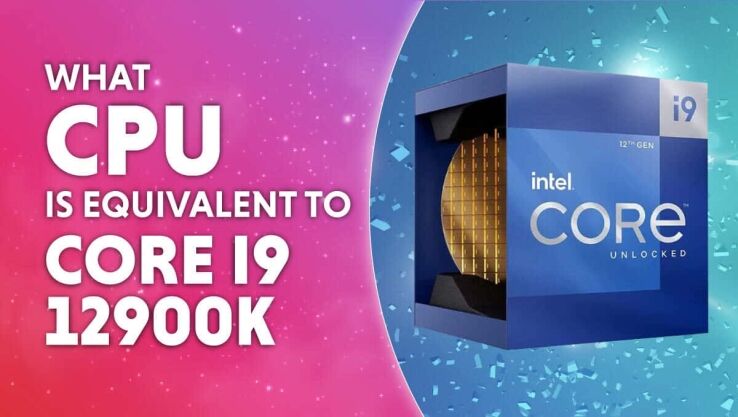What CPU is equivalent to Core i9 12900K
What CPU is equivalent to Core i9 12900K? Let's find out

WePC is reader-supported. When you buy through links on our site, we may earn an affiliate commission. Prices subject to change. Learn more
The Core i9-12900K is one of Intel’s top processors, even now with their 13th generation release. Let’s see whether there’s an equivalent CPU out in the market now for those who would rather not pick up this particular CPU. What CPU is equivalent to Core i9 12900K?
Now Read: Best CPU for gaming 2023
Intel Core i9-12900K specifications
The Core i9-12900K has the following specs.
- Cores: P-cores 8 / E-cores 8
- Threads: 24
- Base clock frequency: P-cores 3.2 GHz / E-cores 2.4 GHz
- Boost clock frequency: P-cores 5.2 GHz / E-cores 3.9 GHz
- L3 cache: 30MB
- Default TDP: 125 W / 241 W boost.
- iGPU: Intel UHD graphics 770
The Alder Lake i9 is a 16-core, 24-thread CPU based on hybrid core architecture. The performance cores do the bulk of the processing while the processor is under intense load, whereas the efficiency cores play a greater role when idling. This intelligent design helps save power and use the processor’s resources more efficiently.
What CPU is equivalent to Core i9 12900K?
We’re going with the Ryzen 9 7900X as the closest equivalent to the Intel Core i9-12900K.
Ryzen 9 7900X
The Ryzen 9 7900X is a 12-core, 24-thread CPU. It has the same thread count as the 12900K processor. However, it does have 4 fewer cores. Now, this doesn’t end up creating a disparity in multicore performance between the two processors the way you may initially expect it to.
AMD Ryzen 9 7900X
Cores
12
Threads
24
Base speed
4.7GHz
Boost speed
5.6GHz
Cache
L3 64MB
Socket
AM5
That’s because the 12900K has 8 efficiency cores and 8 performance cores. The 7900X has 12 cores, but they’re all high-performance cores, which ends up bridging the core-count gap.
The 7900X has an impressive 5.6GHz boost clock, which affords it better single-thread performance than the 12900K. The i9 has a max clock speed of 5.2GHz which, while still great, isn’t exactly on even footing with the 7900X.
The Ryzen 9 7900X also has more L3 cache at 64MBs. The cache is lightning-fast memory stored directly on the CPU chip. It stores important data needed frequently by the processor.
Having a larger cache decreases the frequency with which the CPU has to access the slower RAM for data, improving processor uptime and overall output.
Gaming performance
Gaming is an activity that benefits especially highly from a processor having a high cache.
You can expect the Ryzen to provide you with slightly higher gaming performance in CPU-bound circumstances. However, when you’re in CPU territory this high-end, you’ll never really end up with a CPU bottleneck (at least, if you’re building your PC correctly).
If we talk about power usage and thermals, both processors are quite power-hungry. The Ryzen 9 7900X has a 170-watt TDP, making it somewhat more power-efficient than the 12900K, which has free reign to consume as many as 253 watts of power if it must.
Still, a 170-watt TDP is nothing to scoff at, and you’ll need a decent AIO cooler to keep the CPU from overheating. AMD processors have lower heat tolerance thresholds, as is the case with the 7900X, which will shut down upon breaking a 95°C temperature.
Both the 12900K and the 7900X can be overclocked. But it’s hard to recommend overclocking either due to their already high power usage and thermal output.